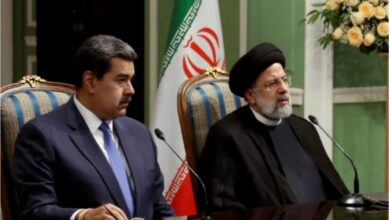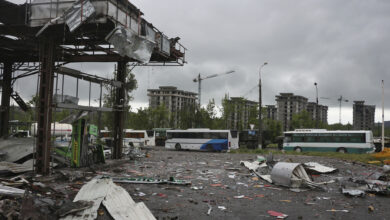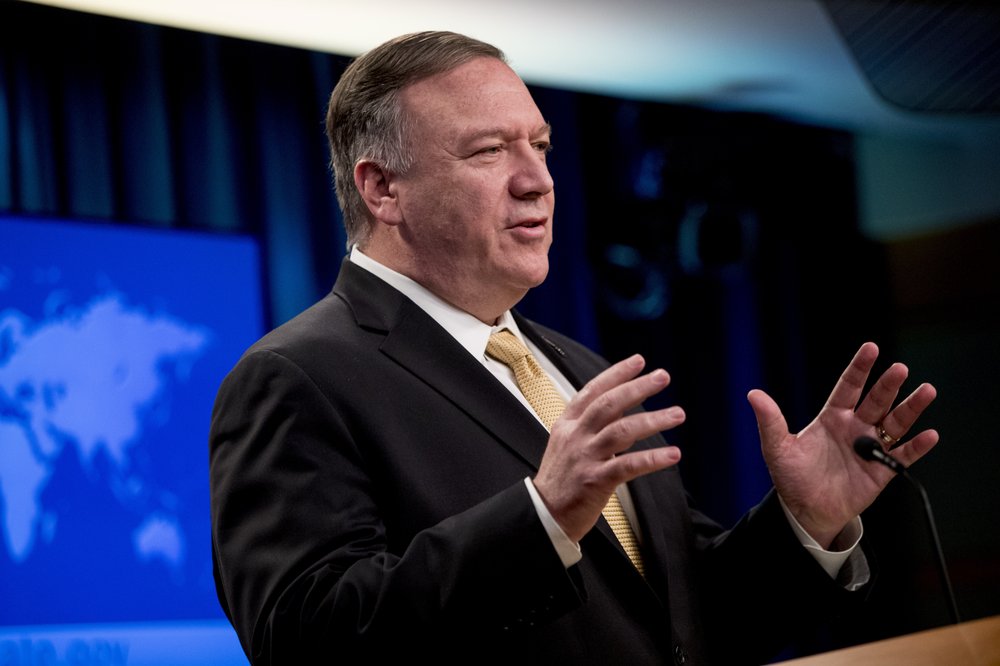Sheikh Naim Qasim, vice-general secretary of Lebanese resistance movement Hizbullah, is well known for his composure and wisdom. Despite his many responsibilities, including the management of Hizbullah’s parliamentary representation, he answered Al-Masry Al-Youm’s questions with enthusiasm and candor.
The trip to the interview venue required switching between three cars with curtained windows, blocking one’s view of the outside world. During the interview, we spoke about current tensions in the region and the possibility of war this summer, as well as the extent of Hizbullah’s preparation for such a conflict. We also touched on relations between Egypt and Hizbullah in light of the recent verdicts in the Egyptian Hizbullah cell case.
Al-Masry Al-Youm: What is Hizbullah’s stand vis-à-vis American accusations that Syria provided the group with Scud missiles?
Sheikh Naim Qasim: We generally refrain from affirming or denying accusations that relate to Hizbullah’s armaments. As a resistance movement, we rely on maintaining secrecy with respect to the types and quantities of our arms, the size of our army and our plans. Such secrecy is an important part of our success, and since we are not an organized army, we cannot afford to boast.
Therefore, we have not responded to the American accusations. However, we believe that the timing of the accusations suggests an attempt to ease pressure on Israel in light of the talk about Israel’s nuclear program and its activities in Jerusalem and the West Bank. America also wants to draw attention away from its various failures and instead focus attention on Hizbullah.
Al-Masry: Do you think these accusations are a pretext for another Israeli attack on Hizbullah and Lebanon?
Qasim: The way I see it, Israel does not need a pretext to attack Lebanon. It is able–at any moment it likes–to invent justifications for such a war and translate recent threats emanating from Israel and America in order to spread fear and extract concessions from Hizbullah.
Moreover, such threats cannot be taken seriously. Israel is currently unprepared to launch an attack on Lebanon or on the region as a whole. Even if it was prepared, it is well aware of the dangers of doing so based on its experience in 2006, which it has no desire to repeat under current political circumstances.
However, even though we do not believe Israel will attack, we still approach the matter as if Israel could strike at any moment and remain prepared.
Al-Masry: Some fear that Hizbullah’s silence threatens to entangle Syria in a future war, following Washington’s declaration that Syria poses a threat to its national security. Do you agree?
Qasim: Syria has already responded to these accusations, and America must read Syria’s message as it was intended. America’s negative stance towards Syria is nothing new. Syria is a resistance state and stands in solidarity with the Palestinian, Lebanese and Iraqi resistances.
Furthermore, there are a number of matters that aggravate America since they represent obstacles to US plans for a new Middle East and prevent its domination of more countries in the region. Syria stands in the way of America’s plans, despite America’s recent recognition of the need for reconciliation with Syria in light of Syria’s standing and influence in the region.
Al-Masry: Israel feels it must attack Hizbullah since the group is now better armed than it was before 2006. What threat does Hizbullah pose to Israel despite the presence of the international forces (UNIFIL) along the Lebanese-Israeli border?
Qasim: Hizbullah constituted a serious impediment to Israeli expansionism, forcing Israel to retreat from Southern Lebanon. It sabotages Israel’s plans to settle Palestinians in Lebanon and provides inspiration to the Palestinians in their resistance against the occupation.
In general, Hizbullah stands in the way of American-Israeli policy in the region. As a result, they constantly raise accusations against Hizbullah. This matter is not a transient one; it relates to how they frame their presence in the region, especially since Israel was implanted into the region against the will of the Palestinians and the region’s inhabitants in general.
The issue is not related to the extent of Hizbullah’s armaments or its military capabilities. Rather, it relates to Hizbullah’s opposition to the Israeli occupation; to its success in 2000 in expelling Israel from Lebanon; to its confrontation with Israel in the summer of 2006; and to its serving as a source of inspiration for the Palestinian people.
Al-Masry: There are those who fear that Hizbullah will be crushed in any future conflict with Israel, particularly in light of Israel’s desire to reclaim the honor it lost on more than one occasion in its conflicts with the organization. What is your take on this?
Qasim: Hizbullah’s situation is far better than it was at the outbreak of hostilities in 2006. Israel could not achieve its goals then, and will not achieve its goals in any future war. Those who fear for Hizbullah should pray for it, assist it and–most of all–trust in God.
We are determined to defend our land, people and honor. We will not allow Israel to seize from us through political means what it was unable to take from us through war. Likewise, Israeli threats will not cause us to retreat, and we are determined to prevent Israel from realizing its hostile goals in Lebanon.
Al-Masry: Were Israel to strike Hizbullah and Lebanon, would you expect a regional war to follow involving Iran and Syria, as Iranian president Ahmadinejad promised during a recent meeting with Syrian President Bashar al-Assad and Sheikh Hassan Nasrallah?
Qasim: I don’t know whether any upcoming Israeli war, if such a war occurs, would envelop Lebanon. There are many scenarios for a coming war; therefore, we will confront Israel according to how events unfold. I cannot claim to know beforehand how Syria or Iran would act in any given situation, just as I cannot know beforehand how Hizbullah would act.
Al-Masry: Israel regularly claims to know a great deal about Hizbullah from its spy network. Does this constitute a threat to the party?
Qasim: Israel has not stopped spying on us for a single moment, and has attempted to spread its networks throughout Lebanon and its various factions. We are at war with Israel, and spying is part and parcel of war. Regardless of what information Israel possesses about the party, we work assiduously to conceal sensitive information. In turn, our spy networks have uncovered several of Israel’s plans.
We have our own counter-intelligence programs, and, ultimately, Israel knows that intelligence wars are not one-sided. Israel is not free to do what it wants. Possessing intelligence by itself does not mean that Israel knows everything. It knows things that people partially knowledgeable about the party would know. However, this does not guarantee it success in battle.
Hizbullah and Lebanon’s military security apparatus struck deep at the heart of Israel’s intelligence network, uncovering numerous high-quality networks and thereby weakening the Israeli intelligence presence in Lebanon. This would explain the increase in Israeli flyovers in Lebanese airspace, which are a way of compensating for their loss of ground intelligence.
Al-Masry: Is there a crisis of trust between the party’s leadership and its followers, as some claim?
Qasim: I reassure everyone that the leadership, members and followers of Hizbullah form an extremely cohesive and effective unit. Together we have recently undergone a number of shared experiences in the Lebanese political arena, including helping form the national unity government, as well as participating in national and local elections.
These various political positions with different parties highlighted the strong cohesion of Hizbullah’s leadership and its unified vision. Hizbullah is known for being one of the few parties with a cohesive organizational structure, with firm ties between the leadership and the base characterized more by love and obedience then by rules and laws.
Al-Masry: You spoke about Walid Jumblatt, and his return to the ranks of the resistance, and about the Syrian-Lebanese rapprochement with Saad Hariri. Some claim that Hariri and Jumblatt received threats from Hizbullah to return to the Syrian fold.
Qasim: You should ask Walid Jumblatt. Over the past year, he has declared on many occasions his complete conviction that his current political stand in support of the resistance and the Palestinian cause is the correct one, and that the period following the assassination of President Hariri was an exception. He wants to return to the Arab camp, as exemplified by Syria; to the central issue of Palestine; and to the ranks of the dignified powers led by the Islamic resistance.
This was Jumblatt’s decision and nothing else, as it represents his strategic vision for his political front and its leadership. Had Hizbullah wanted to scare him into changing his position when he was on the other side, he would have stayed there for four years, stating his views clearly for all to hear.
As for Saad Hariri, he went to Syria of his own accord, because he realized that Lebanon could not move forward unless its relations with Syria were good. Syria cannot accept the presence of a Lebanese state that is a center for counter-Syrian activity, whether in the domains of intelligence, security or sabotage. The Taif Accords stipulated that Lebanese-Syrian relations be exceptional due to their status as neighbors and the common issues shared between them.
Hariri knew he would not be able to comfortably rule Lebanon or present an effective vision for the country without good relations with Syria. He took this decision of his own volition.
Al-Masry: Do you believe that America’s accusations are a means of exerting pressure on Syria and Iran, and that the current US administration differs little from the previous one?
Qasim: Until now, we have not seen any difference in US policy and no difference between Bush and Obama. Yes, we have seen a change in styles. Bush was more aggressive in his support for unilateral wars, while Obama is more eager to apply political pressure and sanctions. They use different methods, but in regards to their political positions, they resemble each other.
As proof of this, look at the US position on the Palestinian issue, which has not changed fundamentally with the change in administration. Israel is allowed to do anything that it wants, while the US pressures the Palestinians and the Arabs in order to gain concessions and prevent the Palestinians from standing united.
Therefore, I don’t think that the current US administration has shown any real change in its methodology and vision.




